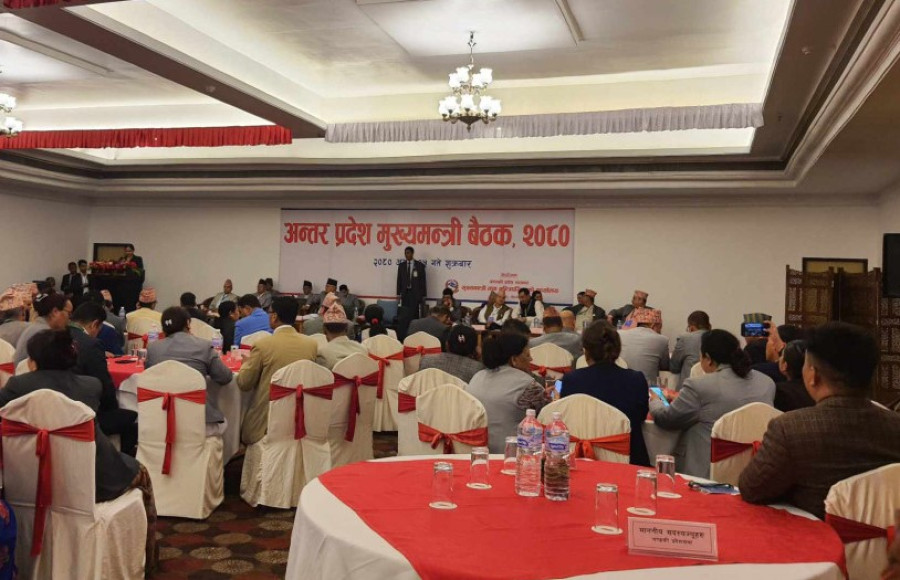National
Chief ministers ask prime minister to facilitate implementation of federalism
Six chiefs of provincial governments meet in Pokhara, asserting their rights as Kathmandu delays crucial laws.
Tika R Pradhan
Chief ministers of six provinces, who have gathered for a meeting in Pokhara, have demanded the prime minister ensure necessary federal laws for smooth functioning of the provincial administrations.
After the hours-long gathering of the chief ministers in the tourist city on Friday, Chief Minister of Gandaki Surendra Raj Pandey, who had called the gathering of the chief ministers, handed over the 17-point demand to Prime Minister Pushpa Kamal Dahal on Friday. Chief Minister Hikmat Karki of Koshi, however, couldn’t join the gathering as he sought a trust vote of the provincial assembly. He lost the vote on Friday.
The meeting of the chief ministers was called at a time when voices against federalism have been growing even within the major political parties, especially the main opposition CPN-UML.
During its three-day-long central committee meeting that concluded on May 13, leaders close to chair KP Sharma Oli including Gokul Baskota and Mahesh Basnet had demanded that the provinces be scrapped.
Even the fifth largest party in the House, the Rajendra Lingden-led Rastriya Prajatantra Party, reiterated the necessity of scrapping federalism through its three-day-long central committee meeting that concluded on May 17.
The Kamal Thapa-led RPP Nepal has already decided that provincial structure should be scrapped as the state cannot afford it.
Chief ministers Saroj Kumar Yadav of Madhes, Shalikram Jamkattel of Bagmati, Dilli Chaudhary of Lumbini, Raj Kumar Sharma of Karnali and Kamal Bahadur Shah of Sudurpaschim were present in the gathering that was also attended by the prime minister.
Rastriya Swatantra Party, the fourth largest in the House, didn’t even field its candidates during the provincial polls held in November last year. The new party has lobbied for radical changes in the provincial structure “to make the federal system viable”.
However, some provinces including Bagmati and Karnali have their assemblies in session. This could affect their presence at the gathering.
Chief Minister Pandey wanted to give continuity to his predecessor Prithvi Subba Gurung’s initiative of convening the meeting.
Gurung brought chief ministers together for the first time in September, 2018. The gathering had issued a nine-point demand, urging the federal government not to bar them from exercising the rights guaranteed by the constitution.
The chief ministers had agreed that they should be more assertive to exercise their rights if the federal government did not facilitate the process. The gathering was an attempt to compile the common agendas of the provinces and present them strongly at the Inter-State Council meeting that would follow. However, then-prime minister KP Sharma Oli had forced them to postpone the council meeting.
The chief ministers have been complaining that they have failed to address people’s aspirations because the federal government didn’t hand over the constitutional rights to the provinces.
Like the first gathering in September 2018, the new set of chief ministers on Friday made similar demands with the prime minister but in a softer tone.
They have demanded a number of federal laws including those related to civil service and police adjustment which the federal government has still been deferring.
“Civil Service Act could not be enacted in the provinces and even the provinces having the law have difficulty implementing it due to the lack of federal law, affecting the career development of civil servants,” states the 17-point charter. “The federal civil service act should be issued at the earliest,” the chief ministers demanded.
They have also soght ownership of the land used by the provinces for administrative purposes, that civil servants not be transferred to the provinces without consulting with the provincial government; and that the provincial ministries should be given direct access to the federal ministries concerned.
After receiving the demands, Prime Minister Dahal pledged serious discussions on them.
“The constitution has clearly divided the roles of the three tiers of government. There is no political consensus on federalism and necessary laws have been deferred,” Dahal said at the closing ceremony of the gathering. “This time we have made utmost effort at implementing federalism. We are clear on theoretical, practical and legal issues. We have prioritised the drafting of necessary laws.”
Chief Minister of Bagmati Jamkattel said that compared to his predecessors, incumbent Prime Minister Dahal was more positive towards the implementation of federalism and giving rights to the provinces and the local level. However, other leaders of provincial governments are unhappy at the way Kathmandu treats them.
According to Jammakattel, the prime minister is preparing to call a meeting of the inter-provincial council soon.




 18.12°C Kathmandu
18.12°C Kathmandu














